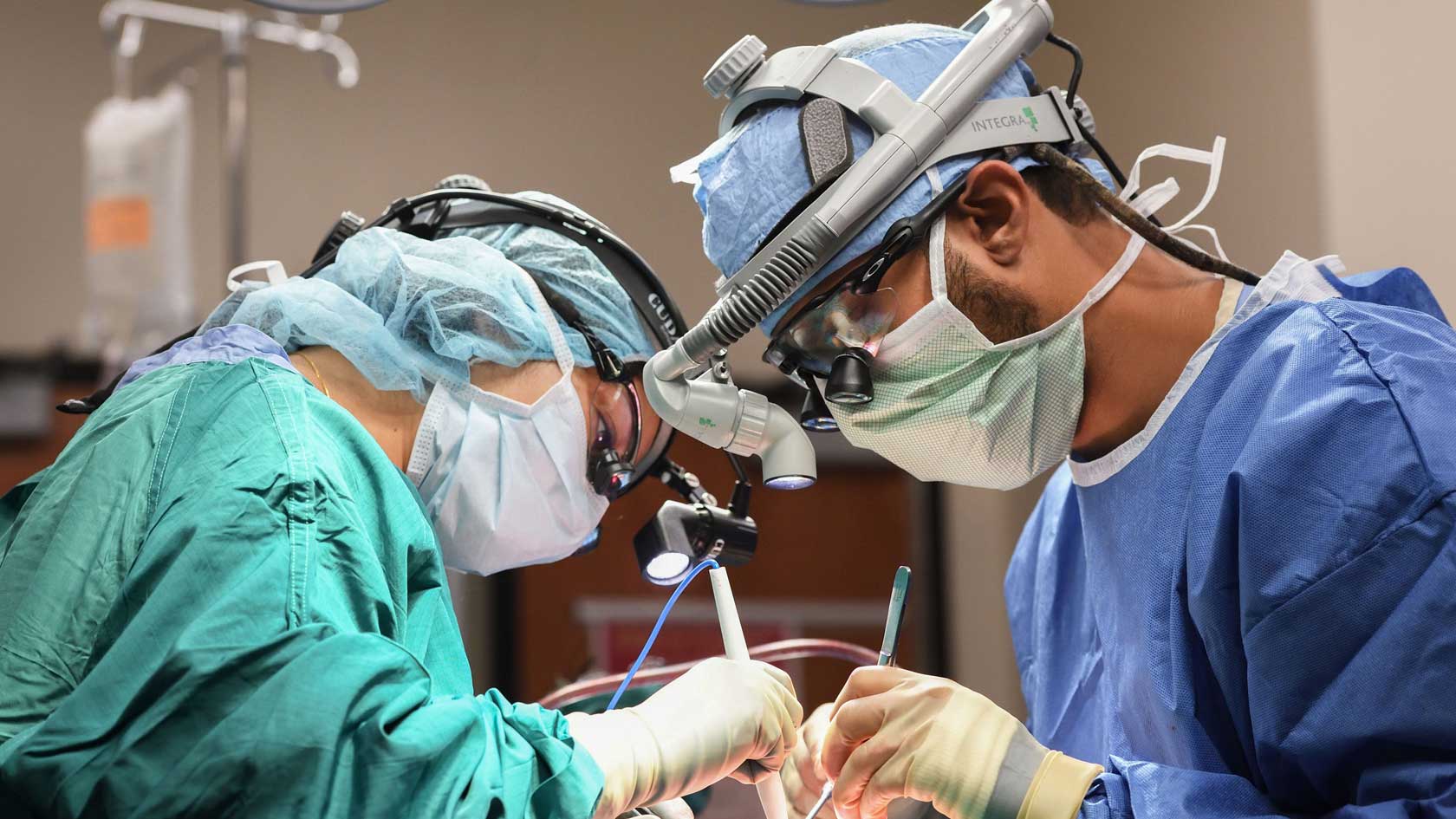How an Otolaryngologist Helps in Diagnosing Complex Head and Neck Conditions
Wiki Article
Exploring the Area of Otolaryngology: What to Expect When You Speak With an ENT
Otolaryngology, frequently described as ENT, incorporates the medical diagnosis and treatment of nose, throat, and ear conditions. Hearing. For those experiencing relevant concerns, consulting an ENT specialist can provide quality and alleviation. Recognizing what to anticipate throughout such examinations is crucial for effective communication and care. This introduction will certainly outline essential elements of the ENT experience, including common factors for check outs and the procedures associated with diagnosis and treatmentUnderstanding Otolaryngology: A Review
Otolaryngology, often described as ENT (Nose, ear, and throat) medicine, is a specific branch of medicine that concentrates on the medical diagnosis and treatment of problems impacting these important areas of the body. This area includes a large array of problems, consisting of those pertaining to hearing, equilibrium, breathing feature, and speech. Otolaryngologists are educated to manage both clinical and medical treatments, making use of innovative strategies and modern technologies. Their know-how prolongs beyond standard disorders, attending to problems such as allergic reactions, sinus infections, and hearing loss. In addition, they play a critical role in the administration of head and neck cancers cells, offering thorough care customized to private person demands. Overall, otolaryngology remains essential for preserving wellness and high quality of life in affected individuals.Usual Reasons to See an ENT Specialist
Numerous people look for the competence of an ENT professional for a selection of reasons, showing the diverse nature of problems that affect the ear, nose, and throat. Usual issues consist of persistent sinus problems, which commonly causes consistent nasal congestion and facial pain. Allergies and their linked signs, such as sneezing and itching, also motivate check outs to these experts. Hearing loss, whether progressive or abrupt, is one more substantial factor for examination. In addition, people might look for evaluation for throat disorders, including relentless hoarseness or swallowing troubles. Sleep apnea, identified by interrupted breathing throughout sleep, is often dealt with by ENT professionals as well. Each of these problems highlights the value of specialized care in managing intricate ENT-related health and wellness problems.Preparing for Your ENT Visit
When planning for an ENT visit, it is essential to collect appropriate info and take into consideration any type of particular problems. Individuals should assemble a detailed clinical history, consisting of previous ear, nose, or throat issues, surgeries, and present medicines. Recording signs and symptoms-- such as regularity, duration, and severity-- can provide useful insights for the ENT expert. Furthermore, people should prepare a listing of concerns they wish to ask, guaranteeing that all worries are attended to throughout the browse through. Bringing along any appropriate medical documents or examination outcomes can further assist the ENT in understanding the individual's problem. Ultimately, people should confirm their appointment details, including date, place, and time, to minimize any kind of last-minute confusion. Appropriate preparation can enhance the effectiveness of the assessment and cause better outcomes.
What to Anticipate During the Examination
As the examination begins, the client can anticipate to participate in a complete conversation with the ENT expert about their symptoms and case history. The expert will certainly ask about the period, frequency, and seriousness of signs and symptoms such as hearing loss, nasal blockage, or aching throat. Additionally, the individual's previous clinical conditions, drugs, and any relevant family history will be reviewed, aiding the expert in forming a complete understanding of the individual's health and wellness. The ENT may also ask concerning lifestyle factors, such as exposure to toxic irritants or irritants. This open dialogue develops a foundation for the consultation, making certain that the client's issues are resolved and setting the phase for any required analyses or recommendations for treatment.Analysis Tests and Treatments in Otolaryngology
A variety of diagnostic examinations and procedures are crucial in otolaryngology to precisely assess and diagnose problems impacting the throat, nose, and ear. Usual examinations include audiometry, which determines hearing feature, and tympanometry, analyzing middle ear stress. Nasal endoscopy permits visualization of the nasal passages and sinuses, while laryngoscopy examines the throat and vocal cables. Imaging strategies, such as CT scans and MRIs, provide thorough sights of head and neck structures. Allergic reaction testing may also be carried out to determine triggers for sinus or breathing problems. These analysis tools allow ENT specialists to develop a complete understanding of individuals' problems, making sure customized and efficient management strategies. Correct diagnosis is necessary for successful therapy results in otolaryngology.Therapy Alternatives Offered by ENT Specialists
ENT experts provide a variety of therapy choices tailored to deal with particular problems impacting the ear, nose, and throat. These treatments vary from conventional approaches, such as medication and way of life adjustments, to even more intrusive procedures. Allergies might be managed with antihistamines or immunotherapy, while persistent sinusitis may need nasal corticosteroids or sinus surgical procedure. For hearing loss, ENT specialists frequently suggest hearing help or surgical treatments like cochlear implants. In instances of throat problems, options can include speech treatment or operations to eliminate obstructions. Additionally, they might give advice for managing sleep apnea, consisting of making use of CPAP devices or surgical interventions. On the whole, the objective is to improve people' lifestyle via individualized care and effective treatment techniques.When to Seek Follow-Up Treatment With an ENT
When to seek follow-up care with an ENT expert is vital for taking care of ongoing signs or complications related to ear, throat, and nose conditions, identifying. Clients need to think about arranging a follow-up appointment if symptoms persist despite first treatment, such as chronic ear pain, nasal blockage, or throat pain. Changes in hearing, equilibrium issues, or uncommon nasal discharge may additionally call for further examination. Furthermore, if an individual experiences adverse effects from suggested drugs or has undergone a medical procedure, follow-up treatment is essential to monitor healing and attend to any issues. Prompt assessments can guarantee reliable administration of problems, avoid prospective complications, and give comfort pertaining to one's health and wellness. Looking for follow-up care advertises aggressive health and wellness management in otolaryngologyFrequently Asked Questions
What Qualifications Should I Look for in an ENT Professional?
When looking for an ENT professional, one need to try to find board certification, appropriate experience, and strong person reviews. Additionally, reliable interaction skills and a compassionate technique can greatly enhance the total therapy experience.How Do I Pick the Right ENT for My Demands?
Picking the best ENT specialist involves reviewing their qualifications, experience, and individual testimonials. It is important to ponder their interaction design and technique to therapy, guaranteeing they line up with the individual's certain health and wellness requirements and choices.Exist Any Threats Related To ENT Procedures?
The threats connected with ENT treatments might consist of infection, bleeding, anesthetic complications, and potential damage to surrounding frameworks. Patients should talk about these risks with their doctor to understand individual worries and warranty notified choices.Exactly How Can I Manage Anxiousness Prior To My ENT Consultation?
To handle anxiousness before a consultation, people can practice deep breathing workouts, envision favorable results, prepare concerns in development, and look for assistance from good friends or family, cultivating a sense of peace of mind and calmness.
What Should I Do if I Experience Adverse Effects From Treatment?
If side results from therapy take place, the individual ought to without delay report them to their doctor. Otolaryngology. Modifications to treatment or extra treatments might be necessary to guarantee security and performance in handling their problem. As the assessment begins, the person can anticipate to involve ENT Doctor in a detailed conversation with the ENT expert concerning their signs and symptoms and clinical history. These analysis tools make it possible for ENT experts to develop a complete understanding of people' conditions, ensuring customized and effective administration strategies. ENT experts provide a variety of therapy choices customized to deal with certain problems affecting the throat, ear, and nose. When looking for an ENT specialist, one must look for board qualification, appropriate experience, and solid person reviews. Picking the ideal ENT specialist includes examining their credentials, experience, and individual reviewsReport this wiki page